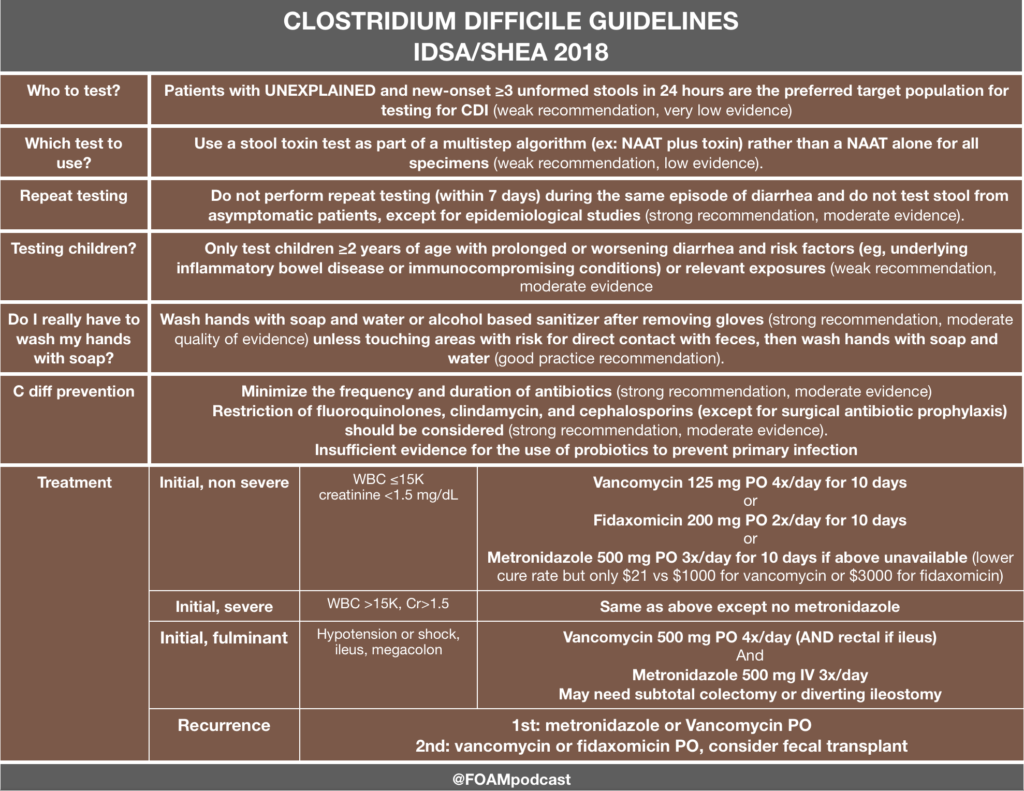The Infectious Disease Society of America (IDSA)/SHEA released new clostridium difficile (c diff) guidelines in 2017.
Rosh Review Emergency Board Review Questions
An 85-year-old woman who was recently treated with ciprofloxacin for a urinary tract infection presents to the emergency department with diarrhea and lightheadedness. Her vital signs are heart rate 95 bpm, blood pressure 84/50 mm Hg, and temperature 38.9°C. Laboratory studies are notable for a white blood cell count of 19,000 and creatinine of 2.8 mg/dL. On abdominal X-ray, the transverse width of the patient’s colon is 7 cm. Chest X-ray and urinalysis are unremarkable. In addition to fluid resuscitation, what is the most appropriate treatment for this patient?
A. Intravenous and rectal vancomycin
B. Intravenous vancomycin and oral ciprofloxacin
C. Oral metronidazole and surgical consultation
D. Oral vancomycin and surgical consultation
[accordion]
[toggle title=”Item 1 Title” state=”closed”]
D. This patient presents with severe, life-threatening Clostridium difficile colitis. This is evidenced by a history of severe diarrhea preceded by recent antibiotic use. When the normal microbial flora of the colon is disrupted by exposure to antibiotics, Clostridium difficile can opportunistically dominate. It produces several toxins, which cause inflammation of the colon (colitis). Clinically, these patients present with watery diarrhea and crampy abdominal pain. Fever is often present, particularly in severe cases. This is a severe case of colitis due to the white blood cell count greater than 15,000, impaired renal function and presence of severe sepsis. This patient should receive empiric treatment with oral vancomycin. Given the dilated colon on abdominal X-ray, this patient likely has toxic megacolon and requires early surgical consultation to evaluate for surgical colectomy (if condition is unresponsive to medical management). Clostridium difficile is a species of gram-positive spore-forming bacteria that can exist in the human colon. A novel macrocyclic antibiotic called fidaxomicin was recently approved for the treatment of Clostridium difficile colitis. However, there is a lack of evidence to support its use in life-threatening illness.
The use of oral metronidazole (C) is appropriate for mild infections, but its use in severe disease is strongly discouraged. Intravenous vancomycin (A and B) is not a recommended treatment for Clostridium difficile colitis, as bactericidal concentrations are not achieved in the colon. Moreover, ciprofloxacin is a cause of Clostridium difficile colitis not a treatment. Rectal vancomycin can be considered as an adjunct to oral vancomycin when ileus is present.
[/toggle]
[/accordion]
